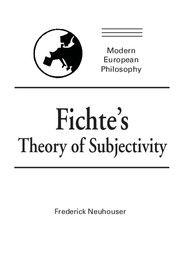Book contents
- Frontmatter
- Contents
- Acknowledgments
- Abbreviations
- Introduction
- 1 Origins of Fichte's theory: the notion of the unity of reason
- 2 The development of Fichte's project from 1793 to 1799
- 3 The self-positing subject and theoretical self-consciousness
- 4 The self-positing subject and practical self-determination
- Conclusion
- Bibliography
- Index
1 - Origins of Fichte's theory: the notion of the unity of reason
Published online by Cambridge University Press: 05 June 2012
- Frontmatter
- Contents
- Acknowledgments
- Abbreviations
- Introduction
- 1 Origins of Fichte's theory: the notion of the unity of reason
- 2 The development of Fichte's project from 1793 to 1799
- 3 The self-positing subject and theoretical self-consciousness
- 4 The self-positing subject and practical self-determination
- Conclusion
- Bibliography
- Index
Summary
The first half of our account of Fichte's theory of subjectivity will be devoted primarily to clarifying the basic nature of his project: What precisely is it that Fichte's theory intends to show, and why does he come to regard the development of such a theory as the central task of philosophy? In the first two chapters we shall attempt to answer these questions by examining the historical origins of Fichte's project and by tracing the developments his conception of that project underwent during the early portion of his career. On the basis of what we already know about the general nature of Fichte's theory, the basic issue that will concern us in Chapters 1 and 2 can be formulated as the following question: What reasons might there be for wanting to demonstrate that a single fundamental structure underlies all forms of subjectivity?
As I indicated in the Introduction, the main problem addressed by Fichte has its roots in questions raised by Kant's successors, and to a lesser extent by Kant himself, concerning the relationship between theoretical and practical reason. The question, more precisely, is whether theoretical and practical reason can be said to constitute a single faculty, or whether they must be regarded as essentially heterogeneous. It is, of course, widely recognized that the issue of the unity of reason becomes one of the principal themes of German Idealism after Kant.
- Type
- Chapter
- Information
- Fichte's Theory of Subjectivity , pp. 11 - 31Publisher: Cambridge University PressPrint publication year: 1990

